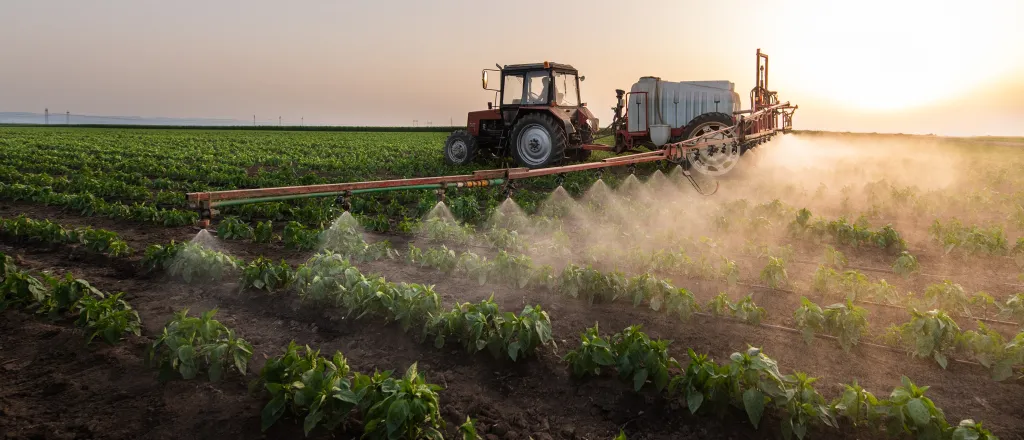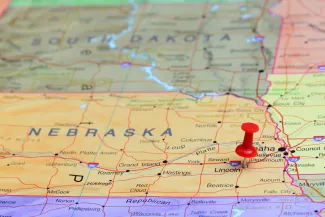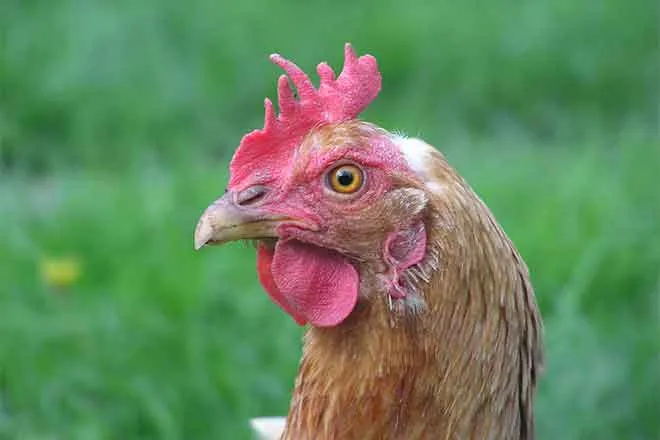
‘AgrAbility’ program helps wheelchair-bound Nebraska farmer return to the field
© fotokostic - iStock-1324890919
Life on the Fass farm was a lot different before that final day of the 2021 Otoe County Fair.
Eric Fass was just one year into his role as the town’s volunteer fire chief. He and wife Amanda also had been growing a small farm they bought eight years earlier. Their three kids, like many rural youths around this city of about 2,000, were showing 4-H livestock at the fair.
But a noise spooked the leashed heifer Jaden Fass was walking with alongside her dad and others. And in a chase to regain control of the runaway animal, Eric Fass was flipped on his head. Resuscitated on the spot in an alleyway, he was rushed to a hospital with traumatic brain injury.

Doctors advised Amanda to summon family and friends — that nothing short of a miracle would pull her first responder and farmer husband, then age 37, through the night.
Four years later, the Nebraska Examiner met with the couple determined to keep pushing through. Eric is trying to regain further mobility on his left side, depends on a wheelchair and breathes through a trach tube.
Throughout it all, the Nebraska natives have refused to give up on their shared passion to farm. But a fund that helped keep their dream alive is on uncertain ground after next year.
Nebraska AgrAbility, a 30-year-old initiative that helps farmers and ranchers with disabilities stay active in the state’s top industry, was key to opening doors to modified equipment and other support that allowed Fass to get out in the field again to do certain chores.
Led by the University of Nebraska-Lincoln extension and Easterseals Nebraska, a primary AgrAbility funding source is the U.S. Department of Agriculture. States compete for four-year grants from the USDA, and the federal government awards for current participants expire next summer.
A new slate of awardees has yet to be selected.
“It helped us get the things we needed to stay on the farm and keep doing what we love to do,” Amanda said of the program. “And to give Eric a purpose.”
A bale buggy, five cows and a big dream
Emily Jacobson, an Easterseals rural rehab specialist and program manager for Nebraska AgrAbility, said she realized quickly upon talking to the Fasses after the July 24, 2021, injury that their goal was to keep farming.
The couple had launched their operation in 2013 with 20 acres, a blue tractor, a bale buggy, five mama cows and, as Amanda put it, “a big dream.” Today, in partnership with other families, they own or rent a couple of hundred acres and raise a small herd that fuels a direct-to-consumer beef business.

© iStock - Rawf8
Before the accident, Eric also had other side gigs such as underground trenching, seed cleaning and custom hay businesses. Amanda worked for the Natural Resources Conservation Service.
“It was obviously going to look different with Eric’s injuries,” said Jacobson, herself a farm-raised Nebraskan. “But they wanted to create a legacy they could pass on down to their kids.”
AgrAbility does not directly buy equipment, but a free comprehensive needs assessment by Jacobson connected the Fasses to partner agencies and resources that largely paid for such tools as a side-by-side all-terrain vehicle tailored to Eric’s needs, a pickup truck with a wheelchair lift and a specialized skid loader with options to control by hand.
For the Fasses, the Syracuse community raised additional funds that covered costs for a motorized chair that can maneuver over tough spots and for various medical and home adaptation needs.
“There was this huge momentum for Eric to begin to realize the possibilities,” Jacobson said. “I always tell people, ‘We’re gonna modify your practices, not your dreams.’”
While Jacobson says she provides in-depth assessment and connector services to 25 to 30 Nebraska farm and ranch families challenged by health and injury setbacks each year, the program reaches several thousand a year through education-related outreach.
AgrAbility salary and operational expenses are funded by the four-year $735,000 grant from the USDA, which provides similar support to about 20 other states that also must enlist a university and a nonprofit partner to oversee the local program. Local officials are gearing up to apply for the next round of funding, and are optimistic.
The Nebraska Legislature directed a total of $600,000 to the State Department of Agriculture for this year and next to help cover costs of assistive technology for eligible farmers served by AgrAbility. The farmer is expected to contribute to the equipment expense.

© Dean_Fikar - iStock-503150251
However, the state is facing a $451 million projected deficit in the two-year budget cycle, and the state Ag Department, in its mid-biennium budget request submitted last month, included a $300,000 cut for the program, saying the proposed reduction was not a reflection of the program but that department officials believe it could be funded by an alternative source.
State Senator Dave Murman of Glenvil, himself a farmer who has championed AgrAbility in the Legislature, said he would do whatever possible to ensure state funding continues.
“I know how important it is to the mental health of a farmer to continue doing what they like to do and still be productive,” he said. Murman said he wants Nebraska farmers to keep operating on their land whenever possible.
The state-federal Nebraska Vocational Rehabilitation program also provides equipment and other support to AgrAbility clients, Jacobson said.
AgrAbility participants range from ranchers suffering from arthritis to amputation or paralysis. Jacobson described Eric Fass as one of the more severe cases.
She gets choked up talking about what the family has gone through, including difficulty and expense of finding rural in-home health care workers.
At one point, an urgent call went out to friends to locate a “sit to stand lift” to replace a broken one used to get Eric to the toilet. Even with specialized farm tools and equipment donated by AgrAbility partners and other resources, extra help and time is necessary, for example, to transfer Eric from wheelchair to farm vehicles.
“It’s put a load on Amanda’s shoulders,” Jacobson said. “Their story is quite amazing, to watch how they’ve overcome challenges and how they continue to work together.”
Work takes more time, planning
On a recent day, Amanda hoisted Eric up from his wheelchair into the driver’s seat of the modified side-by-side utility vehicle. She hopped in, and with Eric’s good arm steering, the two drove off to feed cattle.
“We do things a lot differently,” Amanda said. “Everything takes, I would say, three times longer … we have to be more careful, strategize and be really organized.”
After the accident, the Fasses downsized before starting to grow their operation again with local firefighter and friend Schuylar Argo as a partner. He lives in a camper trailer on the Fass land.
Part of Fass Farms is the rebranded Down Home Beef business, which uses a local meat locker to process meat that’s marketed directly to consumers interested in knowing how the animal was raised. Amanda says the operation manages roughly 60 cow-calf pairs. They also source from other producers and recently bought A&E Feeds LLC.
The Fasses have seen progress in the four years since doctors put part of Eric’s skull in his abdomen to preserve it while brain swelling went down. For example, Eric sometimes can walk short distances with a walker. Challenges continue.
“Everything we’re still doing requires someone’s assistance,” said Amanda. The left side immobility keeps Eric from running large equipment. He tires easily. Speech is created through a vibration device he holds to his neck to produce mechanical-sounding words. Amanda typically helps with conversations.
Amanda said she has at times been physical therapist, occupational therapist, speech therapist and more to help her husband.
Medicaid-related battles to access skilled nursing care had her in tears, she said, before an Easterseals representative came to the rescue.
Ultimately, Amanda resigned from her 20-year conservation career job due to difficulty of finding reliable in-home health care aides, she said.
Agriculture ‘in our blood’
Despite frustration, the Fasses haven’t thrown in the towel on a profession both grew up around.
“Agriculture, it’s in our blood,” Amanda said.
The couple credited programs such as AgrAbility, Easterseals and community support for offering help and hope. Jaden now is in college, sons Abe and Braxton are ages 14 and 12. More recently, a Medicaid waiver program has stabilized in-home caregiving services.
From a medical standpoint, Amanda said, the farther Eric gets from the traumatic brain injury, the less likely he is expected to improve. But the family has overcome odds so far, she noted, and “we just keep working at it.”
Amanda said the Fasses view their operation as “helping to feed the world one family at a time.”
“We gotta keep hanging on,” she said.

















